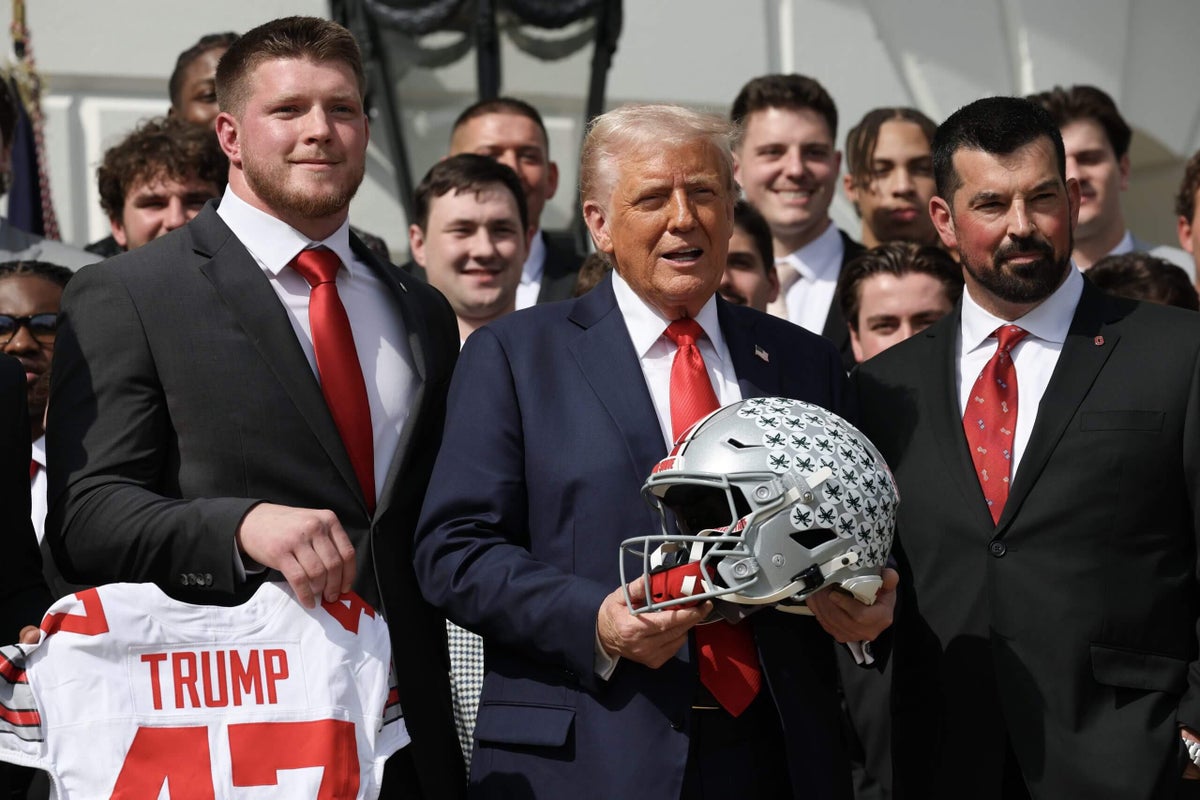
Trump signs executive order aimed at addressing issues in college sports
How did your country report this? Share your view in the comments.
Diverging Reports Breakdown
Trump signs executive order aimed at addressing issues in college sports
President Donald Trump signed an executive order aimed at college sports. The order highlights many of the same goals that were in a draft version of the order. It calls on members of Trump’s cabinet and other political officials to pursue policy and protections. Congress is still a long way from addressing the issue through federal legislation, though there has been some movement on that front.. The NCAA appreciates the Trump Administration’s focus on the. life-changing opportunities college sports provides millions of young people. “We look forward to working with. student-athletes, a bipartisan coalition in Congress and the Trump. Administration to enhance college sports for years to come,” NCAA President. Charlie Baker said. The White House makes clear in the order that it hopes to enforce any policies through “federal funding decisions, enforcement of Title IX of the Education. Amendments Act of 1972, prohibiting unconstitutional actions by States to regulate interstate commerce” and other protections, while working with Congress and state governments. The threat of federal funding decisions is notable.
The order highlights many of the same goals that were in a draft version of the executive order obtained by The Athletic last week: Protecting women’s and Olympic sports; addressing the employment status of college athletes and antitrust issues that have pulled the NCAA and conferences into constant litigation.
Advertisement
One notable addition: “The Order prohibits third-party, pay-for-play payments to collegiate athletes. This does not apply to legitimate, fair-market-value compensation that a third party provides to an athlete, such as for a brand endorsement.”
The EO will direct the Secretary of Labor and the National Labor Relations Board to weigh in on the debate over the employment status of college athletes.
It also calls on members of Trump’s cabinet and other political officials to pursue policy and protections in a number of other areas related to college sports, including rules that could be challenged by antitrust complaints and continued opportunity for scholarships and roster spots.
“A national solution is urgently needed to prevent this situation from deteriorating beyond repair and to protect non-revenue sports, including many women’s sports, that comprise the backbone of intercollegiate athletics, drive American superiority at the Olympics and other international competitions, and catalyze hundreds of thousands of student-athletes to fuel American success in myriad ways,” the order said.
“In many ways, this helps schools more than athletes,” one athletic director told The Athletic on the condition of anonymity. “Not sure how enforceable it is, but it’s a step in the right direction.”
An executive order is not law, and any agency policy decisions could face legal challenges, but the White House makes clear in the order that it hopes to enforce any policies through “federal funding decisions, enforcement of Title IX of the Education Amendments Act of 1972, prohibiting unconstitutional actions by States to regulate interstate commerce” and other protections, while working with Congress and state governments.
The threat of federal funding decisions is notable. Higher education as a whole has been reeling from federal funding stoppages by the Trump administration this year. Northwestern earlier this month announced budget cuts and a hiring freeze after the federal government froze $790 million in research funding. Columbia on Thursday said it would agree to a $200 million fine, which comes months after the federal government canceled $400 million in grants and contracts. Those decisions by the federal government surrounded allegations of antisemitism and discrimination through the promotion of diversity at universities.
Advertisement
“That part definitely caught my attention,” the athletic director said. “Tying compliance to federal funding creates a big stick, especially for public institutions. After everything higher ed has navigated from D.C. this year, this just adds another layer of political and operational uncertainty.”
Trump has mulled getting involved in the continued legal and legislative friction that has surrounded college sports for months and his interest seemed to gain momentum after a meeting with former Alabama coach Nick Saban in May.
The possibility of creating a presidential commission to study issues facing college sports and recommend possible solutions was floated and is still a possibility.
While President Trump’s involvement is seen as significant by increasing the spotlight on the issues facing college sports, an executive order doesn’t provide the long-term solutions that have dogged college sports for years.
“The Association appreciates the Trump Administration’s focus on the life-changing opportunities college sports provides millions of young people and we look forward to working with student-athletes, a bipartisan coalition in Congress and the Trump Administration to enhance college sports for years to come,” NCAA President Charlie Baker said.
The antitrust protections and pre-emption of state laws that college sports leaders have been lobbying for need to come from federal law. There has been some movement on that front.
Statement from the ACC, Big Ten, Big 12, SEC, Pac-12 on Trump’s executive order. Mostly just using it to push approval in Congress. https://t.co/KVv2G283Aw pic.twitter.com/WR1WnJhTVe — Chris Vannini (@ChrisVannini) July 24, 2025
On Wednesday, a bill that would help regulate college sports and how athletes are compensated by schools made it through two House committees, clearing the way for a possible vote when Congress returns from summer recess.
The SCORE Act is the first bill to move through a committee in either chamber, but it has little bipartisan support. Even if it does pass a Republican majority House, it would need 60 votes in the Senate, meaning at least seven Democrats would have to jump on board.
There is no indication yet that it is likely.
Chris Vannini contributed to this story.
(Photo: Win McNamee / Getty Images)
